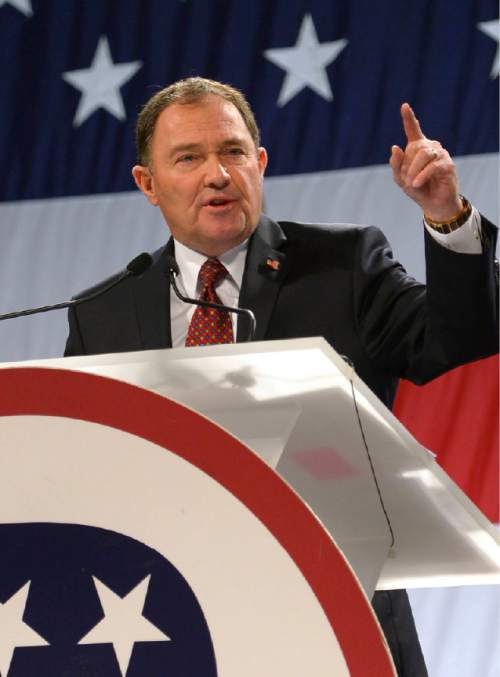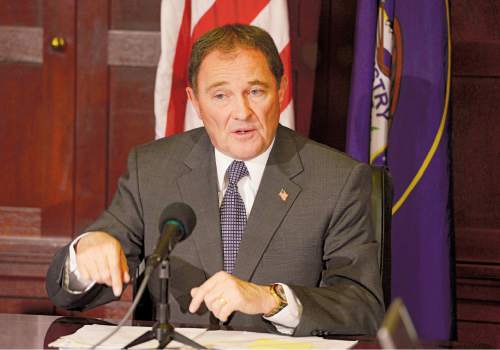This is an archived article that was published on sltrib.com in 2015, and information in the article may be outdated. It is provided only for personal research purposes and may not be reprinted.
Gov. Gary Herbert signed a resolution Thursday to build a new state prison on the west side of Salt Lake City, saying it is clearly the best location available.
"It will have minimal impact negatively to the city of Salt Lake," Herbert said during his monthly KUED news conference. "I'm personally convinced the west-of-the-airport location is the best location."
Salt Lake City officials strongly disagree and have said they aren't giving up the fight, suggesting they may launch an environmental lawsuit or a referendum to try to repeal the relocation bill.
A referendum isn't going to happen.
The Legislature passed the relocation plan by a supermajority, which under the Utah Constitution, means it can't be rescinded by voters, according to Mark Thomas, the state's elections director. Representatives approved the bill 62 to 12 and senators, 21 to 7.
That leaves a lawsuit option and if the city goes that route it would be months from now, after environmental reviews are complete and only if planned talks between the state and city break down.
"Clearly, the decision has been made," said Lynn Pace, an aide to Salt Lake City Mayor Ralph Becker who has tracked the prison-relocation process. "The deal is done, absent some legal option."
Pace said the city will engage with the state to discuss exactly where the prison would be located west of the Salt Lake City International Airport, what it will look like and where roads would be built.
State Sen. Luz Escamilla, D-Salt Lake City, also downplayed the idea of a lawsuit on Thursday, suggesting that it was time to move forward and make the most of adding a prison to the west side, even if she thinks it was the wrong decision.
"We have to move forward," she said.
That's the same message coming from Rep. Brad Wilson, R-Kaysville, a co-chairman of the Prison Relocation Commission, who suggests that Salt Lake City not "waste tax dollars" fighting the decision, but rather seek other ways to support the west-side community.
"I don't think we have given them lemons, but if they think we have given them lemons, they should try to make lemonade out of it," he said, suggesting the city should make another run at legislation to improve the state Fairpark.
The governor said he understands the "anxiety" related to the move. But consultants who studied the move said that, while the Salt Lake site might be costlier in the short-term, in the long-term there will be savings compared to the other sites considered.
Herbert visited the location about five miles west of the airport and called it remote — about 3½ miles from the nearest building, he said — but close enough to transportation systems that it will be convenient for prison employees and volunteers. It also will offer access to hospitals and the courts, he added, "really the things a prison needs.
"I don't think the environmental concerns are any more dramatic out there [west of the airport] than they would be in the [current] Draper site," Herbert said.
And, he said, developing the valuable land in Draper will offset some of the expense of a new prison.
The decision to move the prison culminates a debate that started early in Gov. Jon Huntsman Jr.'s first term. An assessment then said the cost of the new prison did not make it worthwhile.
For several years, lawmakers debated relocating the 4,000-bed prison, ultimately hiring a consultant that narrowed the field to four potential sites before recommending the Salt Lake City location as the best option.
Twitter: @RobertGehrke, @mattcanham





